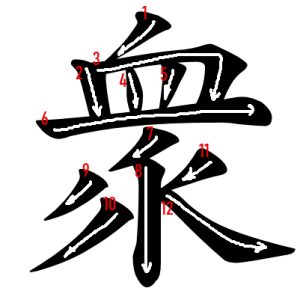Japanese Jouyou-kanji “衆” means “People”, “Folks” or “Public” etc.
| Words |
Meanings |
| 衆意(しゅうい-shu u i) |
Public opinion |
| 衆寡(しゅうか-shu u ka) |
The many and the few |
| 衆寡敵せず(しゅうかてきせず-shu u ka te ki se zu) |
Be hopelessly outnumbered |
| 衆議(しゅうぎ-shu u gi) |
Mass meeting, Mass opinions |
| 衆議院(しゅうぎいん-shu u gi i n) |
House of Representatives, Lower House |
| 衆苦(しゅうく-shu u ku) |
Numerous sufferings, Suffering of many people |
| 衆愚(しゅうぐ-shu u gu) |
Ignorant crowd, Vulgar masses |
| 衆愚政治(しゅうぐせいじ-shu u gu se i ji) |
Ochlocracy, Mobocracy, Mob rule |
| 衆言(しゅうげん-shu u ge n) |
Public opinion, Opinion of the majority |
| 衆口(しゅうこう-shu u ko u) |
Common talk, Talk of the town, Words of many people |
| 衆庶(しゅうしょ-shu u sho) |
Masses, Common people, Folks |
| 衆人(しゅうじん-shu u ji n) |
The people, The public |
| 衆生(しゅうせい-shu u se i) |
Mankind, The people |
| 衆生(しゅじょう-shu jo u) |
All living things, The world |
| 衆説(しゅうせつ-shu u se tsu) |
Various theories |
| 衆多(しゅうた-shu u ta) |
Multitude, Great numbers, Numerous |
| 衆知 or 衆智(しゅうち-shu u chi) |
① The wisdom of the many, ② Well-known |
| 衆評(しゅうひょう-shu u hyo u) |
Public opinion |
| 衆芳(しゅうほう-shu u ho u) |
① Many fragrant flowers, ② Many wise subordinate |
| 衆望(しゅうぼう-shu u bo u) |
Public confidence, Popular support |
| 衆目(しゅうもく-shu u mo ku) |
Public attention |
| 衆力(しゅうりょく-shu u ryo ku) |
The power of many people, The power of a common people |
| 衆論(しゅうろん-shu u ro n) |
Public opinion |
| 衆生済度(しゅじょうさいど-shu jo u sa i do) |
Enlightenment of the masses, Leading the masses on the path of enlightenment (Buddhism) |
| 衆徒(しゅと or しゅうと-shu to (or) shu u to) |
① Many priests, ② Monk-soldiers (Heian era) |
| 烏合の衆(うごうのしゅう-u go u no shu u) |
Disorderly crowd, Mob, Rabble, Herd of cattle |
| 群衆(ぐんしゅう-gu n shu u) |
Crowd, Mob, Multitude |
| 公衆(こうしゅう-ko u shu u) |
Community, Public, General public |
| 大衆(たいしゅう-ta i shu u) |
Populace, Mass, General public, The masses |
| 聴衆(ちょうしゅう-cho u shu u) |
Audience, Auditor, Hearer, Attender, Listener |
| 民衆(みんしゅう-mi n shu u) |
Public, People, Populace, Masses |
| 若衆(わかしゅう-wa ka shu u) |
① Young person, Young man, Young woman, ② Boy who has not yet had his coming-of-age ceremony (Edo period), ③ Young (homosexual) male prostitute, ④ Boy in a homosexual relationship |




Comments